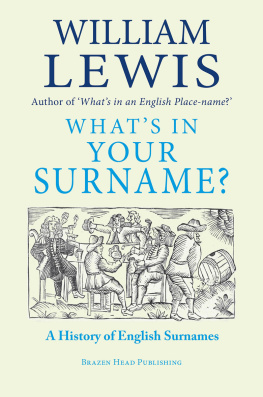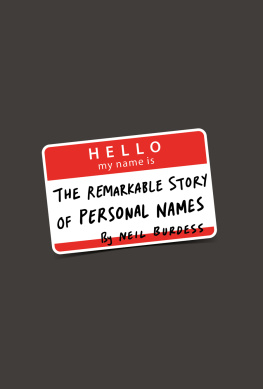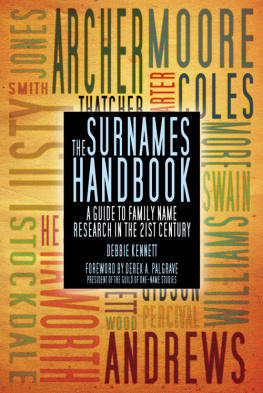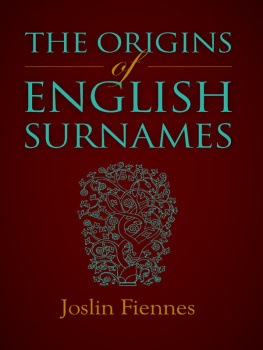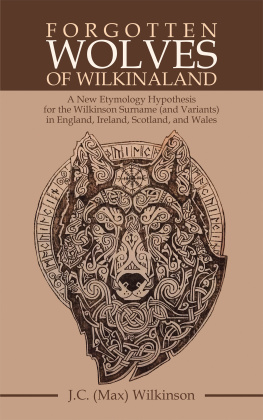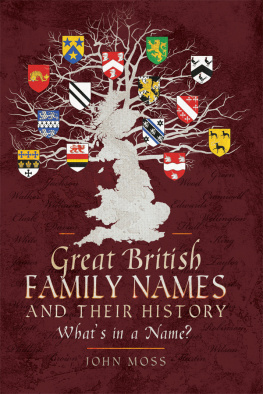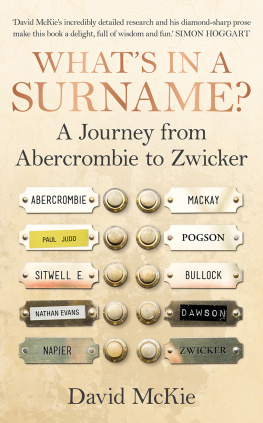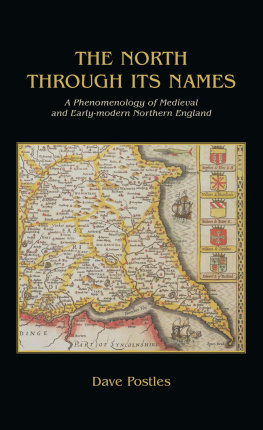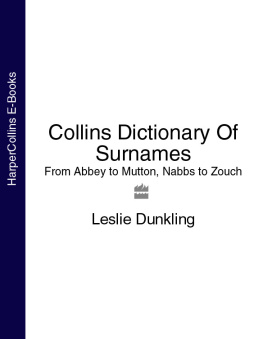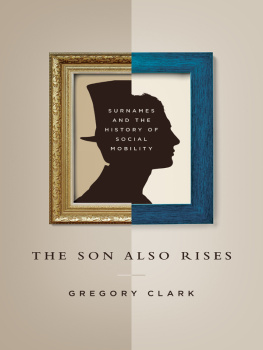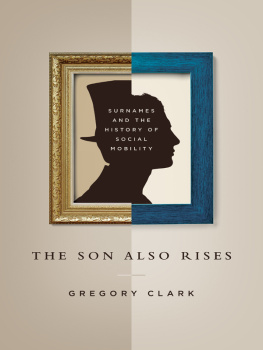WHAT'S IN YOUR SURNAME?
THE FASCINATING STORY OF BRITISH SURNAMES
WILLIAM LEWIS
Published by Brazen Head Publishing at Smashwords
Copyright 2013 William Lewis
4 | Surnames from Local Features
THE MEDIVAL PEASANT was an observant and inventive individual and readily labelled his fellows with descriptive names, flattering and insulting (at least to our modern delicate sensibilities), pleasing and coarse, or just harmless. All of these names were of course, true nicknames of one sort or another, and those I have called harmless often include reference to the location of a persons dwelling: at the edge of a wood, beneath a hill or by a bend in the river. Every feature of the English landscape seems to have come in for a mention: woods, meadows, trees, streams, gates, hills, valleys, bends, crossroads, churches, bridges, hedges, ditches and many more. Our surnames arising from local features do indeed form a large and interesting group.
An easy way to identify or locate a particular individual is to state his or her personal name and follow it with the words at the or by the and then the closest local feature to his or her dwelling. For example, Robert at the wood, which in normal speech will soon be reduced to Robert Attewood, and indeed, this is often how we find such names recorded in early medival documents. Subsequently, the -e- was lost in many cases, as was a -t-, though some of the names listed here are to be found in all three forms.
The meaning of Attwood (and Atwood) ] is obvious and Attlee (and Atlee)(6) could have the same meaning, or else at the clearing in the wood. Other self-explanatory names are Athill (and Atthill) (11), Attfield (and Atfield) (28), Atree (and Attree) (18), Attridge (Atridge ) (25), Attwater (Atwater) (10) and Attwell (Atwell) (39). The surname Attenborough (20) is less obvious, but its meaning becomes clearer when we look at its alternative spelling Attenbarrow, dweller by the mound or hill. Occasionally we will come across names that have lost the -t-' sound completely, like Allaun (0), at the glade, Achurch (1), at the church, Ahearne (27), at the corner and Agutter (3), at the ditch. We will recall that one of Robin Hoods men was called Allan Adale (0), at the valley: the complete absence of this name from the national electoral registers would suggest that it no longer exists.
Another prefix used to pinpoint someone was By- . Such local features as a Ford, Waters, Field and Wood all acquired this syllable: Byford (36), Bywaters (27), Byfield (29) and Bywood (0), though none of these is all that common, as can be seen. Bycroft (0) and Byard (8) both meant dweller by the enclosure, while Bygrave (36) referred to one who dwelt near a grove of trees. Byfleet (1) recalls a dweller by the stream, unless the persons place of origin was Byfleet, a hamlet that grew up around a stream in Surrey.
Some unusual and delightful members of this group are Bythesea (pronounced Bithersee), Bytheseashore (pronounced Bitherseashore), Bytheway and Bysouth, all of which speak charmingly for themselves. I can find no trace of the first two of these in any mainland telephone directory, so their survival is now in question, but the last two do still occur in very small numbers throughout Britain.
The last prefix of any importance we will look at is Under-'. Underhill (33) and Underdown (13) both meant at the foot of the hill, while Underwood (172) may well have recalled the man who lived beneath the wooded hill or simply in the wood. The name Underhay (5) is an uncommon surname nowadays. It is from the Old English word hg and meant an enclosure of some sort, or sometimes just a hedge or fence, so that the name must have been acquired by one who lived or worked next to such a feature.
Woods and trees occur very frequently in our surnames and have done so from an early period. One of the most familiar trees to a medival Englishman was the oak and this tree, in various guises, yields quite a few surnames: Oak (2), Oakes (26), Attock (at the oak) (0 in the London telephone book, though 14 are listed in electoral rolls), Nock (atten oak) (1), Noakes (32), Nokes (6), Rock(e) (21), Roake (4) and even Rook(e) (4).
The ash tree has given us even more surnames than the oak, probably more than twenty, among which are Ash(e) (47) itself, Nash (atten ash) (129) and Dash (11). The surname Nash is by far the most common. There are several compounds which begin with the prefix Ash- : Ashfield (5) (there are several places of this name), Ashcroft (dweller by the pasture or enclosure with the ash tree) (21), Ashwood (also a village in Staffordshire) (3) and Ashley (many place names include this word which means an ash meadow or wood) (87).
Other trees which provide us with familiar surnames are Birch (99), Beech (30), Hazel (18), and Hawthorn(e) (30). Elms (27) is less often met, while Rowan (59) and its companion Rountree (7), that is rowan tree, are also out of the ordinary. The alder, pear and holly trees have left us a substantial legacy between them in Alder (34), Perry (157) and Hollis (37), once again demonstrating that to have lived close to a prominent tree, whatever its type, was likely to have brought forth an appropriate after-name. The willow has also bequeathed us its name, but in its more ancient guise of Sallow (0 in the London 'phone book, but 4 examples survive nationally). The names Sallows (3) and Sallis (1) are variations. The yew tree is one source of the surname Yeo (another is associated with a nearby stream).
Although they are not trees of course, brambles would have been a common sight in hedges and on banks and their blackberries would have introduced a welcome source of sweetness into the autumn diet of many a villager. One who lived among the bramble bushes would have earned himself the name of Briars (2), Briers (4) or Bramble (15). ] mentions such a man recorded in Huntingdonshire, John in le Breres, in the year 1279. Sedge (0) too, appears in our names occasionally, as does Sedgeman (the name given to a thatcher in some localities) (1).
Enclosed land was usually bounded by a hedge (Old English haeg) and one whose dwelling was close to such a feature might well attract the nickname Hedge(s) or Hay. Hayes too, may have meant the same, though it also arises from one who originated in one of the many places of that name (Kent, Middlesex, Warwickshire, Somerset and Sussex for example).

